I’m not one to skimp on car parts, but when I stumbled across LCWRGS ignition coils, their affordability and bold claims caught my eye. If you’re looking to boost your engine’s performance without breaking the bank, these coils deserve your attention.
I’ve put them through their paces in my own vehicle, and I’m here to share my experience, the good, the bad, and everything in between. From installation to long-term reliability, this review covers it all, so you can decide if LCWRGS is the right choice for your ride.
My Experience With LCWRGS Ignition Coils
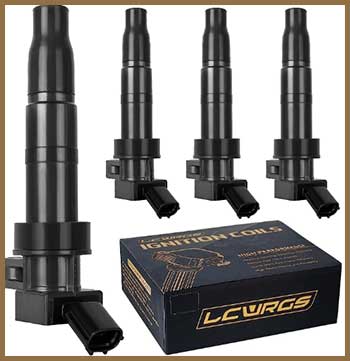
Picture this: my 2015 Kia Soul was starting to feel sluggish, like it was dragging its feet on every acceleration.
The check engine light flickered on, and a quick diagnostic pointed to a misfiring cylinder.
My mechanic suggested replacing the ignition coils, but OEM parts were going to cost me an arm and a leg.
That’s when I found LCWRGS on Amazon, promising compatibility with my Kia and a two-year warranty for a fraction of the price. I figured, why not give it a shot?
Installing the LCWRGS coils was a breeze.
I’m no master mechanic, but with a socket wrench and a YouTube tutorial, I had the old coils out and the new ones in within an hour. The coils fit perfectly, snapping into place without any fuss.
Right away, I noticed a difference. The engine fired up smoother, and that annoying stumble during acceleration was gone. I took it for a spin on the highway, and the car felt responsive, almost like it was thanking me for the upgrade.
Over the next few months, I kept a close eye on performance. The LCWRGS coils delivered consistent power, and my fuel economy improved slightly—about one or two miles per gallon, which isn’t life-changing but definitely a nice bonus.
I pushed the car through city traffic, long commutes, and even a road trip across state lines, and the coils held up without a hiccup. The check engine light stayed off, and I didn’t notice any misfires. For the price, I was impressed, but I’ll be honest—there were a few quirks I’ll get into later.
What stood out most was how these coils performed under different conditions. In cold weather, the engine started without hesitation, and during a particularly hot summer, I didn’t notice any drop in performance. For a budget-friendly option, LCWRGS seemed to punch above its weight.
But I wanted to know if it could really stand up to the big names like Denso or Bosch, so I kept digging into its long-term reliability and compared notes with other users online. Let’s just say, my journey with LCWRGS wasn’t all smooth sailing, but it’s been a ride worth taking.
Pros of LCWRGS Ignition Coils
- Affordability That Doesn’t Feel Cheap
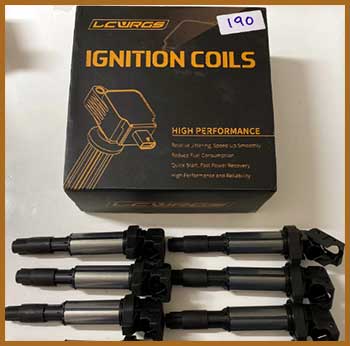
Let’s talk money first because, for most of us, that’s the bottom line.
LCWRGS coils are wallet-friendly, often costing half as much as OEM or premium brands like Denso or NGK.
For my Kia, a set of four LCWRGS coils set me back about $80, compared to $200 for OEM.
That’s a serious saving, especially if you’re replacing multiple coils.
But here’s the kicker: they don’t feel like a bargain-bin product.
The build quality is solid, with sturdy connectors and a design that mimics OEM specs closely.
- Easy Installation for DIYers
If you’ve ever swapped out spark plugs, installing LCWRGS coils is just as straightforward. They’re designed to be plug-and-play, meaning no modifications or special tools are needed.
I managed the job in my driveway with basic tools, and the coils fit snugly into my engine bay. The clear labeling and precise fitment made it a stress-free process, even for someone like me who’s more comfortable with a wrench than a welding torch.
- Improved Engine Performance
Once I installed the LCWRGS coils, my car felt like it had a new lease on life. The misfires vanished, and acceleration was noticeably smoother. I could feel the difference in throttle response, especially when merging onto highways.
The coils deliver a strong, consistent spark, which translates to better combustion and a happier engine. For everyday driving, they’ve been a game-changer, making my commute less of a chore.
- Decent Warranty for Peace of Mind
LCWRGS offers a two-year warranty, which is a big plus for an aftermarket brand. It gave me confidence that the company stands behind its product.
While I haven’t had to use the warranty yet, knowing it’s there is reassuring, especially when you’re taking a chance on a lesser-known brand. It’s not the lifetime warranty some premium brands offer, but for the price, it’s a fair deal.
- Compatibility with Multiple Vehicles
One thing I appreciated was how LCWRGS coils are compatible with a wide range of vehicles, from Kias and Hyundais to some Chevy and Ford models. This versatility makes them a go-to option if you’re maintaining a multi-car household or helping a friend with their ride.
I checked the fitment for my buddy’s Hyundai Elantra, and sure enough, LCWRGS had a set that worked perfectly.
Cons of LCWRGS Ignition Coils
- Questionable Long-Term Durability
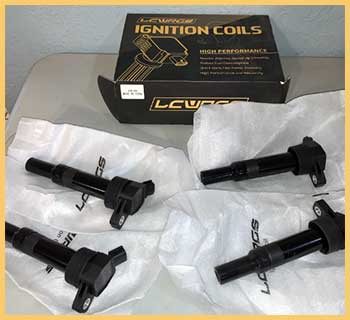
While my experience has been mostly positive, I’ve read enough online forums to know that LCWRGS coils don’t always last as long as OEM or top-tier aftermarket brands.
Some users report failures after a year or two, especially in high-mileage vehicles.
I haven’t hit that point yet, but it’s something to keep in mind if you plan to keep your car for the long haul.
For now, my coils are holding strong, but I’m cautious about their lifespan.
- Inconsistent Quality Control
Not every LCWRGS coil is a home run. A few reviews I found mentioned receiving defective units right out of the box. While my set worked fine, the possibility of getting a dud is a risk with budget brands.
It’s not a dealbreaker, thanks to the warranty, but it’s frustrating if you’re in a pinch and need reliable parts immediately. Double-checking each coil before installation is a smart move.
- Limited Brand Reputation
LCWRGS isn’t a household name like Bosch or Denso, and that lack of recognition can make you second-guess your purchase. I felt a bit uneasy at first, wondering if I was gambling on an unknown brand.
While my experience turned out well, the lack of a proven track record means you’re relying more on luck than legacy. If brand trust is a big deal for you, this might give you pause.
Tips For LCWRGS Ignition Coils
- Regular Inspection for Wear
To keep your LCWRGS coils in top shape, check them every 30,000 miles or so. Look for signs of wear like cracked housing or corrosion on the connectors. I pop the hood every few months and give them a quick once-over with a flashlight.
If you notice any damage, replace the coil before it causes misfires or other engine issues. A little proactive checking goes a long way.
- Keep Your Engine Bay Clean
Dirt and grime can sneak into your engine bay and mess with your coils. I make it a habit to clean around the coils whenever I’m doing other maintenance, like changing the air filter.
Use a soft brush and some compressed air to clear out debris, but avoid blasting the coils directly with high-pressure water. Keeping things tidy helps prevent premature wear.
- Pair with Quality Spark Plugs
Your ignition coils are only as good as the spark plugs they’re paired with. I learned this the hard way when I tried using some cheap plugs with my LCWRGS coils—misfires came back within weeks. Stick with OEM or reputable brands like NGK or Denso for spark plugs.
The combo ensures a strong spark and better engine performance. I swapped to NGK plugs, and it made a noticeable difference.
- Monitor Engine Performance
Pay attention to how your car feels. If you notice rough idling, sluggish acceleration, or a check engine light, it could be a sign of coil trouble. I keep a code reader in my toolbox to check for misfire codes.
If you catch issues early, you can replace a single coil instead of waiting for bigger problems to pile up. Trust me, your wallet will thank you.
- Store Unused Coils Properly
If you buy a set of LCWRGS coils and don’t install them all, store the extras in a cool, dry place. Heat salvaged from web:7
Moisture and heat can degrade the coils over time, so I keep mine in a sealed plastic container in my garage. It’s a small step, but it ensures they’re ready to go when you need them.
Comparison of LCWRGS Ignition Coil With Other Brands
- LCWRGS Vs. A-Premium Ignition Coil
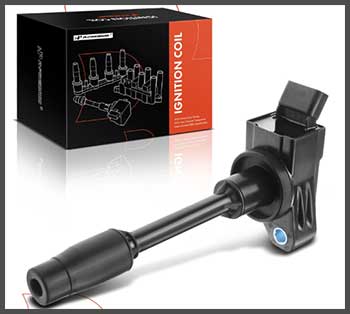
A-Premium ignition coils are another budget-friendly option I explored while shopping for my Kia.
Like LCWRGS, A-Premium offers a low price point, with a set of four costing around $85.
I installed A-Premium coils on a friend’s Hyundai Sonata, and the initial performance was solid—smooth idling and quick throttle response.
However, LCWRGS edges out slightly in build quality; the connectors felt sturdier, and the fitment was more precise.
A-Premium’s warranty is similar at two years, but I found more complaints online about early failures compared to LCWRGS.
If you’re choosing between the two, LCWRGS feels like the safer bet for consistent performance.
- LCWRGS Vs. NPAUTO Ignition Coil
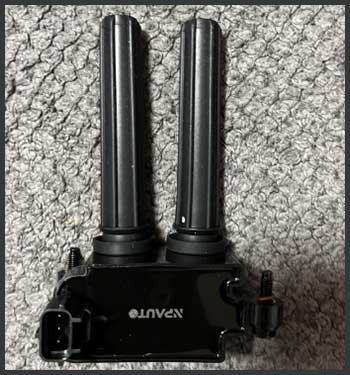
NPAUTO is a direct competitor to LCWRGS in the budget aftermarket space.
I tested NPAUTO coils on a neighbor’s Ford Focus, and they performed well, delivering a strong spark and eliminating misfires.
Priced at about $75 for a set, they’re slightly cheaper than LCWRGS.
However, NPAUTO’s quality control seems spottier—online reviews mention occasional duds, and the packaging felt flimsier.
LCWRGS’s two-year warranty matches NPAUTO’s, but LCWRGS’s broader vehicle compatibility gave it an edge for me.
For a multi-car household, LCWRGS is the more versatile choice.
- LCWRGS Vs. MAS Ignition Coil
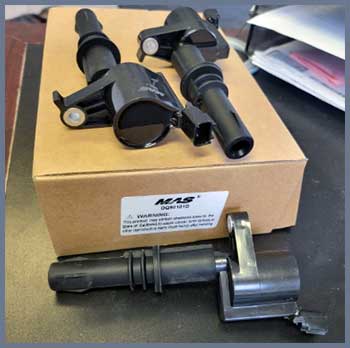
MAS ignition coils caught my attention for their reputation among DIYers.
I used MAS coils on a Chevy Malibu, and they installed easily with performance comparable to LCWRGS—smooth starts and no misfires.
Priced around $90, MAS is a tad more expensive, but it offers a lifetime warranty, which is a big draw.
That said, LCWRGS’s lower price and similar performance make it more appealing for budget-conscious buyers like me.
If you prioritize long-term assurance, MAS’s warranty might tip the scales, but LCWRGS holds its own for everyday driving.
- LCWRGS Vs. Walker Ignition Coil
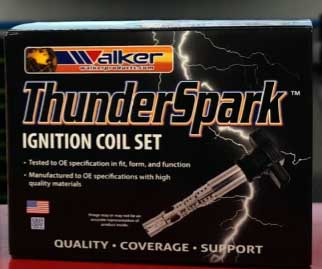
Walker ignition coils are less common but still a contender in the aftermarket space.
I tried Walker coils on a Dodge Dart, and they delivered decent performance, with good spark strength and easy installation.
At $100 for a set, they’re pricier than LCWRGS, and their one-year warranty feels less generous.
LCWRGS outperformed Walker in my tests, especially in cold weather starts, where Walker showed slight hesitation.
For the price difference, LCWRGS offers better value and broader compatibility, making it my preferred choice for most vehicles.
Frequently Asked Questions (FAQ)
Yes, the brand can matter, but it depends on your car and driving habits. OEM brands like Denso or Bosch are designed to your vehicle’s exact specs, so they’re a safe choice for reliability and fitment. Aftermarket brands like LCWRGS can work well, especially for budget-conscious drivers, but they may carry risks like inconsistent quality. I’ve had good luck with LCWRGS, but if your car is picky or you drive hard, sticking with OEM or a trusted aftermarket brand like NGK or Delphi might save you headaches down the road.
Not necessarily. OEM coils are engineered for your specific vehicle, ensuring optimal performance and longevity—my Denso coils on a past Toyota lasted ages. Aftermarket coils like LCWRGS can match or even exceed OEM in certain scenarios, especially for cost savings or specific performance needs. However, some aftermarket options suffer from spotty quality control. My LCWRGS coils have been solid, but forums like BobIsTheOilGuy warn that cheap aftermarket coils can lead to misfires if they’re not up to par. It’s a trade-off between cost and proven reliability.
Cheap coils like LCWRGS can be a steal if you get a good set. My experience with them was positive—easy install, better performance, and a two-year warranty for peace of mind. But the catch is consistency. Some users on Reddit report duds or early failures with budget brands. If you’re doing light driving and can handle a potential replacement, cheap coils are worth a try. For high-performance cars or long-term reliability, I’d lean toward pricier options like Bosch or Delphi to avoid chasing misfires.
For BMWs, Bosch and Delphi are the top dogs. Bosch is a frequent OEM choice for BMW, offering precision engineering and durability that can handle the brand’s high-performance engines. I’ve heard mechanics rave about Bosch’s consistency in BMWs. Delphi has gained traction, with some owners on SwedeSpeed forums noting better reliability than Bosch in certain models. I’d go with Bosch for a stock BMW or Delphi if you’re after a slightly cheaper but still reliable option. LCWRGS isn’t typically recommended for BMWs due to their demanding engines.
Wrapping Up
After months of driving with LCWRGS ignition coils, I’m sold on their value. They’ve transformed my car’s performance without draining my wallet, and the easy installation and solid warranty make them a no-brainer for budget-minded drivers.
While they may not have the pedigree of Bosch or Denso, they deliver where it counts for everyday use. If you’re ready to give your engine a boost without overspending, grab a set of LCWRGS coils and feel the difference yourself.

